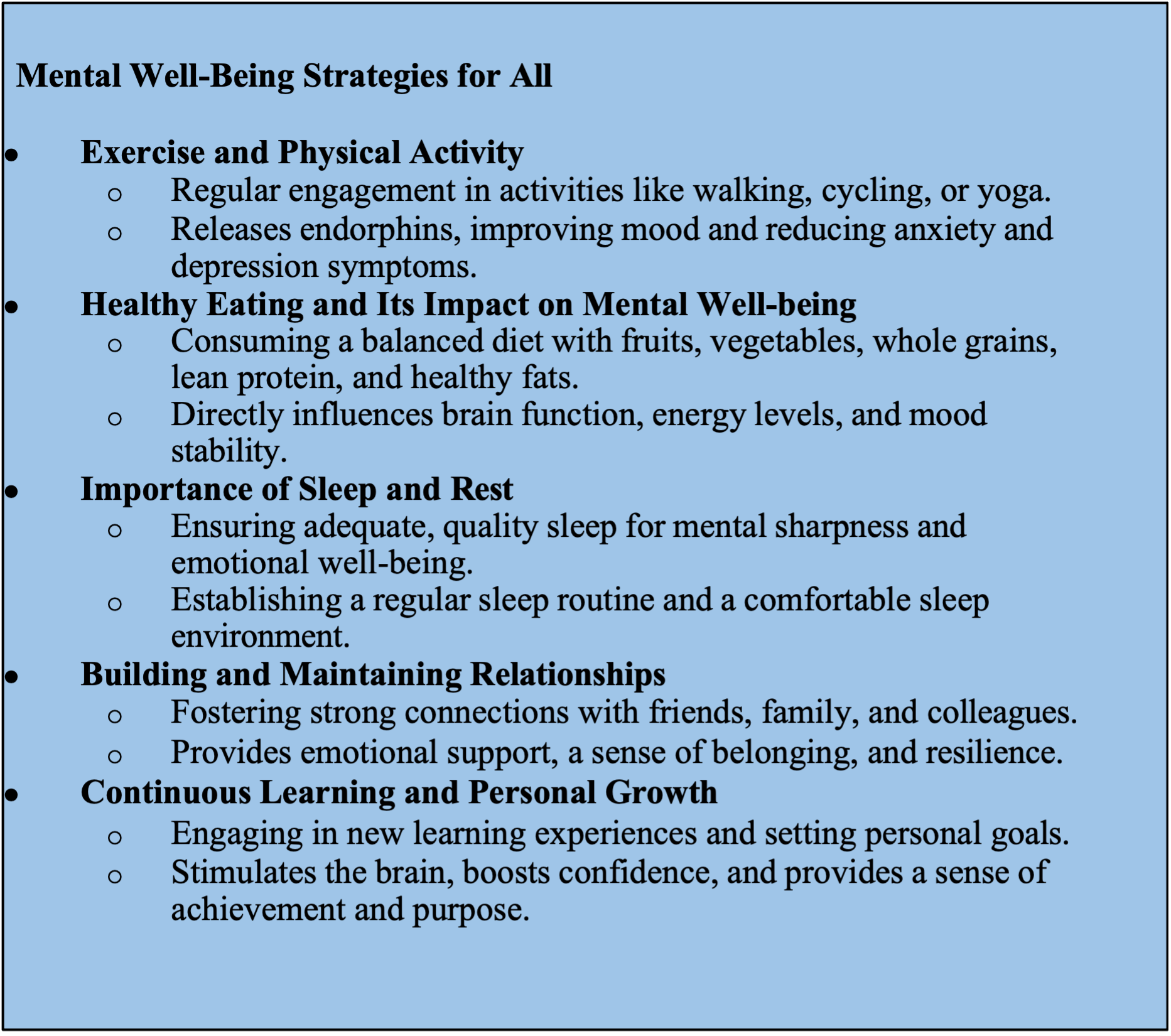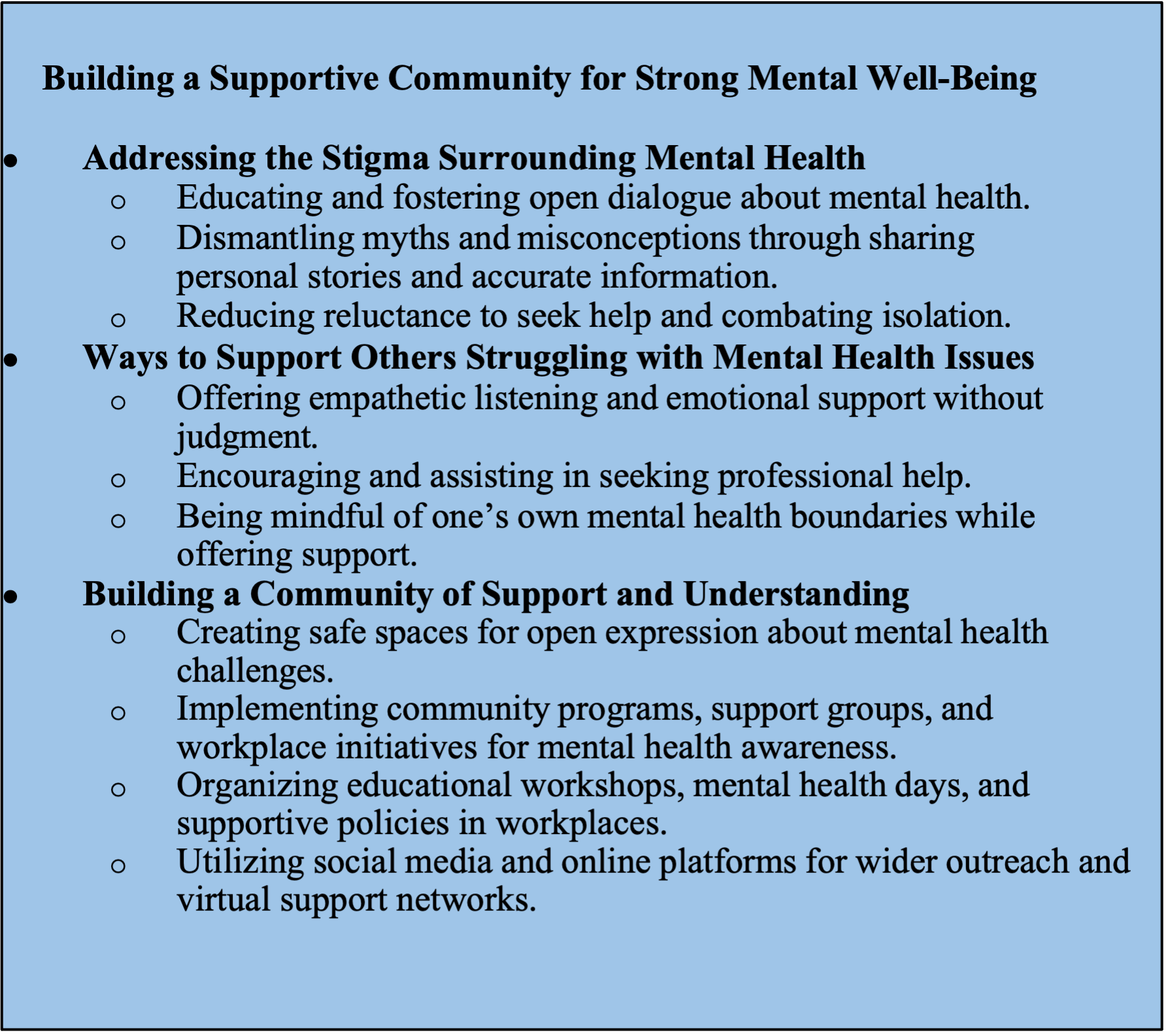Introduction
In the demanding and often high-pressure world of the legal profession, the significance of mental health takes on a particularly critical role. Lawyers, paralegals, and others within the law industry frequently face intense stress, tight deadlines, and high-stakes scenarios, making their mental well-being an area that needs attention and care. Yet, in an industry where thought, resilience and toughness are highly valued, mental health concerns can be easily overlooked or undervalued, leading to not just personal distress but also professional repercussions. Moreover, improving and maintaining mental well-being should not just be for those who currently have poor mental well-being, but for everyone. Mental well-being preparedness is a skill that everyone can develop, regardless of your current state of mind.
This article aims to address this key, and sometimes undervalued, aspect of everyone in the legal profession, not just those who may have poor mental well-being. We recognize that mental health is not a one-dimensional concept but varies greatly across the spectrum of the legal workforce. Our goal is to provide meaningful advice and strategies for enhancing mental well- being, tailored specifically for those within the law industry. Whether someone is grappling with mental health challenges or looking to maintain their current state of good mental health, this article offers insights and practical steps that are relevant and applicable.
By acknowledging the unique pressures faced in the legal field, this article offers both a guide for those experiencing mental health difficulties and a toolkit for individuals with good mental health to continue thriving. From managing the stresses of a high-pressure legal environment to maintaining work-life balance and building resilience, the forthcoming sections delve into a range of topics aimed at fostering a healthier, more productive professional life in the law industry.
Understanding Mental Health
Mental health, often misunderstood, encompasses our emotional, psychological, and social well- being. It influences how we think, feel, and act, playing a pivotal role in how we handle stress, relate to others, and make choices. In the simplest terms, it’s not just the absence of mental illness; it’s a state of overall well-being where an individual realizes their own abilities, can cope with the normal stresses of life, work productively, and contribute to their community. In the context of daily life, this means being able to navigate through challenges, build strong relationships, and pursue goals with a sense of purpose and confidence.
Despite its critical importance, mental health is often shrouded in misconceptions. One common myth is that mental health issues are a sign of weakness or a character flaw. This couldn’t be further from the truth. Mental health challenges can affect anyone, regardless of strength, character, or resilience. Another widespread misconception is the belief that mental health problems are permanent. Many people with mental health issues can and do get better, especially with the right support and treatment.
Understanding the spectrum of mental health is crucial. Mental health is not a binary state of being “ill” or “healthy.” Instead, it varies greatly from person to person and can fluctuate over time due to a multitude of factors. For some, good mental health might mean the ability to perform daily tasks without significant distress, while for others, it could mean thriving with high levels of emotional and psychological well-being. This spectrum perspective helps in recognizing that everyone’s mental health needs are different and that a one-size-fits-all approach is ineffective.
Recognizing the spectrum also helps in destigmatizing mental health issues. It underscores the fact that just like physical health, mental health requires ongoing attention and care. This perspective is essential, especially in a professional setting, where acknowledging and accommodating the varied mental health needs of individuals can lead to a more productive, empathetic, and supportive workplace environment.
In summary, mental health is a complex and integral part of our lives, affecting how we think, feel, and act. Dispelling myths and understanding its spectrum nature is key to addressing mental health appropriately and compassionately in both personal and professional spheres.
For Those Struggling with Poor Mental Health
Recognizing the signs of poor mental health is the first crucial step towards seeking help and improving one’s well-being. These signs can be varied and multifaceted, ranging from prolonged feelings of sadness or despair, excessive fears or worries, extreme mood changes, withdrawal from friends and activities, to significant tiredness, low energy, or sleeping problems.
Understanding that these symptoms can be indicators of underlying mental health issues is essential in taking proactive steps towards recovery.
Seeking professional help is often the most effective course of action for those experiencing mental health difficulties. This can include therapy or counseling, where trained professionals offer a safe space to explore and understand one’s thoughts, feelings, and behaviors, and develop strategies to cope with them. For some, medication prescribed by a psychiatrist or other medical professional might be necessary and beneficial. It’s important to remember that seeking professional help is a sign of strength, not weakness. It signifies taking control of one’s life and well-being.
In addition to professional help, there are several self-help strategies that can be beneficial. Engaging in cognitive-behavioral therapy (CBT), either with a therapist or through self-guided resources, can be particularly effective. CBT focuses on identifying and changing negative thought patterns and behaviors, fostering a more positive and realistic outlook. Regular exercise is another powerful tool; it not only improves physical health but also has significant benefits for mental health, such as reducing anxiety and depression symptoms, and boosting mood and self- esteem.
The role of a support system cannot be understated in the journey towards better mental health. Friends and family can provide emotional support, understanding, and encouragement. However, it’s also important to recognize the value of support groups. These groups bring together individuals facing similar mental health challenges, providing a sense of community and shared understanding. They can be a source of comfort, practical advice, and a reminder that one is not alone in their struggles.
For anyone grappling with poor mental health, it’s important to remember that there is hope and numerous avenues for help and self-improvement. Taking the first step, whether it’s recognizing the need for help, seeking professional assistance, adopting self-help strategies, or reaching out to a support network, is a brave and vital move towards a healthier, more fulfilling life.
For Those with Good Mental Health
For individuals who currently enjoy good mental health, maintaining this state is just as important as improving it. Central to this maintenance is the practice of self-care. Self-care involves actively taking steps to preserve or improve one’s own health and includes a range of practices that promote overall well-being. This can be as simple as ensuring adequate sleep, engaging in regular physical activity, and eating a balanced diet. It also means setting aside time for relaxation and hobbies, and practicing mindfulness or meditation to stay mentally grounded. Self-care is not a luxury, but a necessary component of a healthy, balanced life.
Proactive strategies play a critical role in maintaining good mental health. Effective stress management is key. This might involve identifying stressors and developing coping mechanisms, such as deep breathing exercises, yoga, or engaging in leisure activities that one finds relaxing.
Maintaining a healthy work-life balance is also crucial. It’s easy to get caught up in the demands of work, but setting boundaries between professional and personal life is essential for mental well-being. This includes dedicating time to family, friends, and hobbies, and knowing when to disconnect from work-related responsibilities.
Another aspect of maintaining good mental health is making healthy lifestyle choices. This encompasses a wide range of actions from choosing a nutritious diet to avoiding harmful habits like excessive alcohol consumption or tobacco use. Regular physical activity is not only good for the body but also has a profound positive impact on mental health, enhancing mood and reducing symptoms of anxiety and depression.
The role of regular mental health check-ups is often overlooked but is as vital as physical health check-ups. Just as one would visit a doctor for a routine physical examination, periodic mental health assessments with a professional can be beneficial, even for those who feel mentally well. These check-ups can help identify any emerging issues before they become problematic and provide an opportunity for health care professionals to offer advice on maintaining mental well- being.
For those with good mental health, these practices are not just preventive measures; they are investments in one’s ongoing well-being and happiness. By prioritizing self-care, proactive strategies, and regular check-ups, individuals can sustain and enhance their mental health, navigating life’s ups and downs with resilience and positivity.
Common Strategies Beneficial for Everyone
Irrespective of one’s current state of mental health, there are universal strategies that can significantly contribute to overall mental well-being. These practices are beneficial for everyone, acting as both preventive and enhancing measures for mental health.
Exercise and Physical Activity: Regular exercise and physical activity are paramount for mental health. Physical activity releases endorphins, often known as ‘feel-good’ hormones, which act as natural mood lifters. Exercise also helps reduce anxiety and depression symptoms, improves sleep quality, and boosts self-esteem. This doesn’t necessarily mean engaging in intense workouts; even moderate activities like walking, cycling, or yoga can have profound effects on mental well-being.
Healthy Eating and Its Impact on Mental Well-being: What we eat has a direct impact on how we feel. A diet rich in fruits, vegetables, whole grains, lean protein, and healthy fats can improve brain function and energy levels, and stabilize mood swings. Nutrient deficiencies, on the other hand, can lead to fatigue and a decline in mental health. Maintaining a balanced diet is not just about physical health; it’s a crucial aspect of mental wellness.
Importance of Sleep and Rest: Adequate sleep is a cornerstone of mental health. Sleep deprivation can lead to irritability, stress, and cognitive impairment, while quality sleep enhances memory, creativity, and problem-solving skills. Establishing a regular sleep routine, creating a comfortable sleep environment, and avoiding stimulants before bedtime are key practices for getting the restorative sleep our minds and bodies need.
Building and Maintaining Relationships: Humans are inherently social beings, and having a supportive network of relationships is vital for mental health. Strong connections with friends, family, and colleagues provide a sense of belonging and support. These relationships offer an avenue for sharing experiences, expressing emotions, and receiving empathy and understanding. Building and nurturing these connections can lead to improved mental well-being and resilience in the face of life’s challenges.
Continuous Learning and Personal Growth: Engaging in continuous learning and seeking personal growth can also positively impact mental health. Learning new skills, taking on challenges, and setting goals contribute to a sense of achievement and fulfillment. Whether it’s learning a new language, picking up a new hobby, or pursuing further education, these activities stimulate the brain, boost confidence, and provide a sense of purpose and direction.
By incorporating these strategies into daily life, individuals can greatly enhance their mental health and overall quality of life. Exercise, healthy eating, sufficient sleep, strong relationships, and ongoing personal development are foundational elements that support and enrich our mental landscape.

Overcoming Stigma and Building a Supportive Community and Workforce
One of the most significant barriers to achieving a mentally healthy workforce is the stigma surrounding mental health. This stigma manifests in many forms, from misconceptions and stereotypes to discrimination against those struggling with mental health issues. It often leads to a reluctance to seek help, isolation, and worsening of mental health conditions. Overcoming this stigma is crucial, and it begins with education and open dialogue. By openly discussing mental health, sharing personal stories, and providing accurate information, we can dismantle myths and foster a more inclusive understanding of mental health.
Supporting others who are struggling with mental health issues is a key component of building a caring and empathetic community. This can be achieved through simple yet impactful actions.
Listening without judgment, offering emotional support, and showing genuine concern and empathy can make a significant difference in someone’s life. Encouraging and assisting them in seeking professional help when necessary is also crucial. It’s important to remember that while offering support, one should also be mindful of their own mental health boundaries.
Building a community of support and understanding involves creating spaces where individuals feel safe to express their mental health challenges without fear of judgment. This can be achieved through community programs, support groups, and workplace initiatives that focus on mental health awareness and inclusivity. In such environments, individuals are more likely to open up, share their experiences, and seek help. Educational workshops, mental health days, and promoting policies that support mental health in the workplace are effective ways to cultivate such an environment.
Additionally, leveraging the power of social media and online platforms can extend this supportive community beyond physical boundaries. Online forums, virtual support groups, and mental health advocacy campaigns can reach a wider audience, providing support and resources to those who might not have access to them locally.

Conclusion
This article has journeyed through the multifaceted realm of mental health, exploring strategies and insights for both those struggling with mental health issues and those currently enjoying good mental well-being. We’ve underscored the importance of recognizing signs of poor mental health, the effectiveness of professional help, and the power of self-care and support systems.
For those with good mental health, we emphasized the importance of maintaining it through self- care, stress management, balanced living, and regular mental health check-ups. We also highlighted universal strategies beneficial to everyone: exercise, healthy eating, adequate sleep, nurturing relationships, and continuous learning and growth.
The key takeaway from our discussion is the universal importance of mental health. It’s an integral part of our lives, deeply intertwined with our overall well-being and daily functioning. Therefore, it is crucial for each of us to take proactive steps in maintaining and improving our mental health. This involves being mindful of our own mental state, seeking help when needed, and continually engaging in practices that promote mental well-being.
Call to Action
As we conclude, we encourage you, our readers, to not only reflect on the insights shared but also to actively apply them in your lives. Share this article with your friends, family, and colleagues to spread awareness and understanding of mental health. If you or someone you know is struggling, remember that seeking help is a sign of strength and the first step towards recovery. Let’s also remember to support others in their mental health journey, offering a listening ear, understanding, and empathy.
Together, we can break the stigma surrounding mental health, build supportive communities, and work towards a future where mental well-being is a priority for everyone. Let’s commit to making mental health a part of our everyday conversation and action, for a healthier, more resilient society.
References
Chan, W., Immink, M. A., & Hillier, S. (2012). Yoga and exercise for symptoms of depression and anxiety in people with poststroke disability: A randomized, controlled pilot trial. Alternative Therapies in Health and Medicine, 18(3), 34-43.
Chang, L., Cloak, C. C., & Ernst, T. (2003). Magnetic resonance spectroscopy studies of GABA in neuropsychiatric disorders. Journal of Clinical Psychiatry, 64(Suppl 3), 7-14.
Saeed, S. A., Antonacci, D. J., & Bloch, R. M. (2010). Exercise, yoga, and meditation for depressive and anxiety disorders. American Family Physician, 81(8), 981-986.
Chu, A. H., Koh, D., Moy, F. M., & Müller-Riemenschneider, F. (2014). Do workplace physical activity interventions improve mental health outcomes? Occupational Medicine (London), 64(4), 235-245.
DiStasio, S. A. (2008). Integrating yoga into cancer care. Clinical Journal of Oncology Nursing, 12(1), 125- 130.
Kamble, P., Daulatabad, V. S., Tandra, H., Singhal, A., U M., & John, N. A. (2023). Yoganidra to Alleviate Anxiety: An Interventional Study. Cureus, 15(9), e45083.
Nespor, K., & Csémy, L. (2006). [Psychotropic effects of physical activity]. Cas Lek Cesk, 145(12), 916-917.
Brown, R. S. (1982). Exercise and mental health in the pediatric population. Clinical Sports Medicine, 1(3), 515-527.
Heidarianpour, A., Shokri, E., Sadeghian, E., Cheraghi, F., & Razavi, Z. (2023). Combined training in addition to cortisol reduction can improve the mental health of girls with precocious puberty and obesity. Frontiers in Pediatrics, 11, 1241744.
Rahman, M. M., Islam, M. R., & Emran, T. B. (2022). Impact of nutrition in brain function and development: Potential brain foods. International Journal of Surgery, 106, 106908.
Dauncey, M. J. (2009). New insights into nutrition and cognitive neuroscience. Proceedings of the Nutrition Society, 68(4), 408-415.
Gómez-Pinilla, F. (2008). Brain foods: The effects of nutrients on brain function. Nature Reviews Neuroscience, 9(7), 568-578.
Lupton, J. R., Blumberg, J. B., L’Abbe, M., LeDoux, M., Rice, H. B., von Schacky, C., Yaktine, A., & Griffiths,
- C. (2016). The Impact of Nutrients on Mental Health and Well-Being: Insights From the Literature.
Ensari, I., Sandroff, B. M., & Motl, R. W. (2016). Effects of single bouts of walking exercise and yoga on acute mood symptoms in people with multiple sclerosis. Anxiety Stress Coping, 30(1), 15-25.
Freeman, A. M., Tribe, R. H., Stott, J. C. H., & Pilling, S. (2019). Open Dialogue: A Review of the Evidence. Psychiatric Services, 70(1), 46-59. doi: 10.1176/appi.ps.201800236.
Lorenz-Artz, K., Bierbooms, J., & Bongers, I. (2022). Introducing Peer-supported Open Dialogue in changing mental health care. Frontiers in Psychology, 13, 1056071. doi: 10.3389/fpsyg.2022.1056071.
Alonso-Fernández, A., Sánchez-García, I., & Martín, M. J. (2021). What are the barriers, facilitators and interventions targeting help-seeking behaviours for common mental health problems in adolescents? A systematic review. BMC Psychiatry, 21(1), 1-19. DOI: 10.1186/s12888-021-03242-z
Evans, M., & Fisher, E. B. (2022). Social Isolation and Mental Health: The Role of Nondirective and Directive Social Support. Community Mental Health Journal, 58(1), 20-40.
In conclusion, overcoming the stigma surrounding mental health, supporting others, and building a community of understanding are intertwined efforts. Together, they create a strong foundation for a more mentally healthy society, where individuals feel empowered to seek help and support each other in their mental health journeys.

